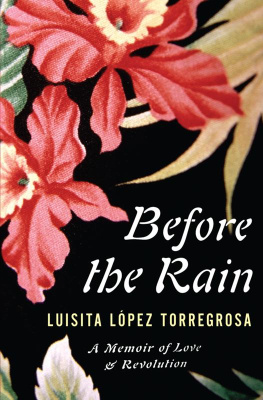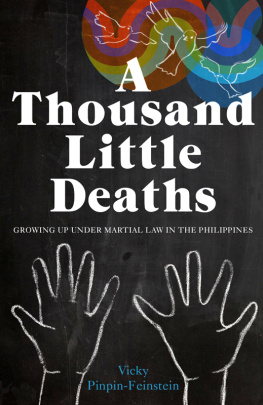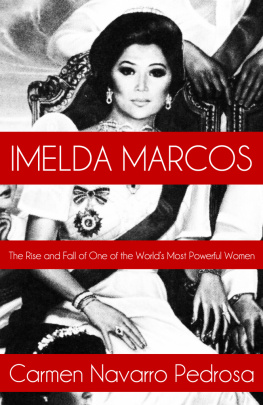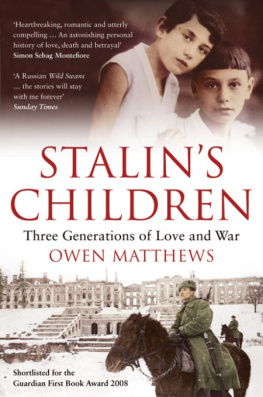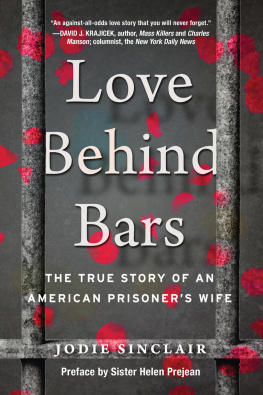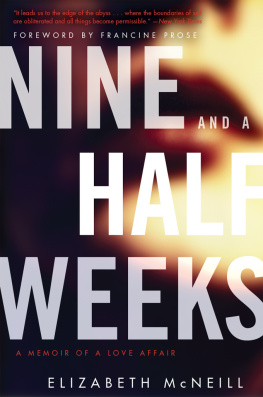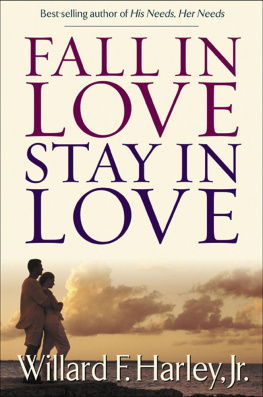Torregrosa - Before the rain: a memoir of love and revolution
Here you can read online Torregrosa - Before the rain: a memoir of love and revolution full text of the book (entire story) in english for free. Download pdf and epub, get meaning, cover and reviews about this ebook. City: Boston;Philippines;United States, year: 2012, publisher: Houghton Mifflin Harcourt;HMH Books, genre: Non-fiction. Description of the work, (preface) as well as reviews are available. Best literature library LitArk.com created for fans of good reading and offers a wide selection of genres:
Romance novel
Science fiction
Adventure
Detective
Science
History
Home and family
Prose
Art
Politics
Computer
Non-fiction
Religion
Business
Children
Humor
Choose a favorite category and find really read worthwhile books. Enjoy immersion in the world of imagination, feel the emotions of the characters or learn something new for yourself, make an fascinating discovery.
- Book:Before the rain: a memoir of love and revolution
- Author:
- Publisher:Houghton Mifflin Harcourt;HMH Books
- Genre:
- Year:2012
- City:Boston;Philippines;United States
- Rating:4 / 5
- Favourites:Add to favourites
- Your mark:
- 80
- 1
- 2
- 3
- 4
- 5
Before the rain: a memoir of love and revolution: summary, description and annotation
We offer to read an annotation, description, summary or preface (depends on what the author of the book "Before the rain: a memoir of love and revolution" wrote himself). If you haven't found the necessary information about the book — write in the comments, we will try to find it.
Torregrosa: author's other books
Who wrote Before the rain: a memoir of love and revolution? Find out the surname, the name of the author of the book and a list of all author's works by series.
Before the rain: a memoir of love and revolution — read online for free the complete book (whole text) full work
Below is the text of the book, divided by pages. System saving the place of the last page read, allows you to conveniently read the book "Before the rain: a memoir of love and revolution" online for free, without having to search again every time where you left off. Put a bookmark, and you can go to the page where you finished reading at any time.
Font size:
Interval:
Bookmark:
This is a work of nonfiction, a true account of my experiences as I remember them. However, I have changed some names, places, and identifying characteristics in order to protect the privacy of various individuals.
Copyright 2012 by Luisita Lpez Torregrosa
All rights reserved
For information about permission to reproduce selections from this book, write to or to Permissions, Houghton Mifflin Harcourt Publishing Company, 3 Park Avenue, 19th Floor, New York, New York 10016.
hmhco.com
The Library of Congress has cataloged the print edition as follows:
Torregrosa, Luisita Lpez.
Before the rain : a memoir of love and revolution / Luisita Lpez Torregrosa.
p. cm.
ISBN 978-0-547-66920-5
1. Torregrosa, Luisita Lpez. 2. JournalistsUnited StatesBiography. 3. PhilippinesHistoryRevolution, 1986Personal narratives, American I. Title.
PN 4874. T 6246 A 3 2012 070.92dc23
[B] 2011037314
Cover design by Patrick Barry
Cover photograph Stephen Wolf/Graphistock/Corbis
e ISBN 978-0-547-66923-6
v2.0518
Lines from Vixen from The Vixen by W. S. Merwin, copyright 1995 by W. S. Merwin. Used by permission of Alfred A. Knopf, a division of Random House, Inc.
This book is for Kathy Robbins.
Comet of stillness princess of what is over
high note held without trembling without voice without sound
aura of complete darkness keeper of the kept secrets
of the destroyed stories the escaped dreams the sentences
never caught in words warden of where the river went...
W. S. Merwin, Vixen
I N THE YEARS since that first letter came, postmarked New Delhi and written on pale lavender Claridges Hotel stationery, I have begun this story a hundred times, and each time I was afraid. We are entering winter now, much like the one, years ago, when I left my house and a dead relationship behind in the suburbs to stay at a friends brick row house on a seedy street in the city, a bleak neighborhood of boarded-up ramshackle buildings, crack heads, and brown kids on roller skates. We called it Orchard Housea home for transient friends, broken hearts, and boozy evenings. Sooty, drafty, with creaking wooden floors and cigarette burns on the furniture, it was a place for great passions.
For a while that December, people came night and day, girls calling Tim on the phone, itinerant buddies bunking upstairs in rooms thick with dust and stale smoke. He had bought the house cheap from a couple who gave up on the block. Tim weeded the small patio out back, put in bricks, and planted tomatoes, basil, and rosemary, which, in wonder, I watched shoot up into city life. Gallery posters picked up in Italy, along with black-and-white blowups of grim scenes of poverty, were hung on the walls next to photos of dreamy girlfriends, all taken by his journalist colleagues and friends. Tim couldnt throw anything away; books were piled up on tables and desks, under his bed, and on bathroom shelves. He saved postcards, the sillier the better, and stuck them to the refrigerator, on mirrors, on the cupboards.
Any occasion was worth a party. For his big dinners, he walked several blocks to the farmers market. There he stocked up on arugula, fennel, red lettuce, and shrimp or swordfish. He would cook up a huge pot of Cajun gumbo stew laced with so much Tabasco sauce, it burned the tongue. He was a dilettante cook, an improviser, who in a snap could create a dish out of nothing. He made it look simple, but he literally sweated out that stew, mopping his face and neck as he chopped onions and garlic, stirred the pot, tossed the salad, mixed drinks, and answered the buzzing doorbell. I used to watch him with envy on those nights, his curly hair matted, his shirt soaked, moving with ease from one guest to another, warming up the crowd, sometimes picking up his guitar and strumming a few chords. I marveled at how he spotted the overflowing ashtray, the empty wineglass, or the lone guest in a corner. I thought he would make a great wife.
Many evenings he was out late. There was nothing for me but the empty night with constant replays of my breakup of weeks earlier. Again and again, I remembered the winter chill in that rambling house in the suburbs as, over and over, I recalled the last words I said before I picked up my coat and slammed the back door, got into my car, and drove into the city to Tims place. It was a cycle familiar to me: pursuit and ardor followed by domesticity, routine, sexual indifference, and the end. We unraveled slowly, going round in seemingly endless circles. By the time I walked out that evening in December 1985 with all the flourishes, tears, and drama the moment demanded, that relationship had been dying for a long time, and I had already fallen for someone else but could not admit it to anyone, not even to myself.
The routine of the workweek gave me only a semblance of ordinary life. I went through the motions, the mindless tasks, getting dressed in jeans, pinstriped shirt, V-neck sweater; picking up the papers thrown on the dining room floor, sorting out the sections, reading them front to back; no food, but cups of strong coffee. By ten oclock I was bundled up in an old charcoal-gray overcoat and trundling down to work, passing a grubby bodega, a couple of old hardware stores, a twenty-four-hour takeout diner reeking of onions and burned grease, and homeless beggars wrapped in burlap rags, huddling for heat on steam grates. This part of town was a ruin, rusting away. I walked looking at the ground, the strap of my leather bag weighing my shoulder down, hands balled up in my coat pockets.
Thirty minutes it took me to arrive at the brass and glass doors of the newspaper, a 1920s gray and white tower with marble stairways, brass banisters, and the smell shared by newspapers the world around: ink, cigarette smoke, newsprint. Up on three, the newsroom was a sprawl of battered desks, scuffed floors, and fiberglass-enclosed cubbyholes. The Foreign Desk, where I was an editor, was jammed into the northeast corner of the newsroom. We sat elbow to elbow at a cluster of six desks set side by side in two rows, banging our chairs, overhearing each others phone conversations, catching dribbles of gossip. I had the far-corner desk, where I could prop up my feet on a windowsill and get a glimmer of sky out a dingy window. Most of the time I was busy, reading and editing copy, empty coffee cups stacking up on my desk.
In those days the Foreign Desk had an aura. We had only six correspondents to cover the wars, revolutions, and coups of the mid-1980s: the carnage of civil war in Beirut, where the bombing of the U.S. Marines barracks ratcheted up round-the-clock mayhem; New Delhi, where Sikh guards assassinated Indira Gandhi, her bullet-ridden body bleeding out in her garden; Johannesburg, where the tragedy of racial hatred was played out in violence day after day.
Our reporters rode motorcycles and camels, let their hair grow long and marriages fail, drank heavily, and wandered off into the sub-Saharan deserts to tribal villages and remote refugee camps under siege. We kept a long list of national and metro reporters who wanted to grab the handful of overseas assignments, the plum jobs. They would come over to the desk and sidle up to the foreign editor, pitching their ideas, offering to go anywhere in the world, inflating their credentials (three languages, world travel, even a license in scuba diving).
We played up the romance of the job, tacking up on our bulletin board the postcards, souvenirs, and goofy snapshots of our correspondents fooling around, in baseball caps, khaki vests, sunglasses, arms manfully crossed on their chests as they lounged in swimming trunks against aqua blue seas and palm trees. Deskbound, wan under the newsrooms fluorescent lighting, we thought ourselves part of the action out there in the field, imagined ourselves inside the postcards as we sat eating our bland lunches of Cobb salads and tuna sandwiches. It was on the Foreign Desk that my longing for far places came out of nowhere. I was terrified of flying and hadnt crossed any sea or land in the air for years. But the stories out of Damascus, Eritrea and Mombasa, Goa and Cairo, reminded me of my childhood in hot countries, in the Caribbean, and traveling from Puerto Rico to Havana to Mexico City, where my father studied medicine. They reminded me too of my mother, slowly turning the pages of a copy of the
Font size:
Interval:
Bookmark:
Similar books «Before the rain: a memoir of love and revolution»
Look at similar books to Before the rain: a memoir of love and revolution. We have selected literature similar in name and meaning in the hope of providing readers with more options to find new, interesting, not yet read works.
Discussion, reviews of the book Before the rain: a memoir of love and revolution and just readers' own opinions. Leave your comments, write what you think about the work, its meaning or the main characters. Specify what exactly you liked and what you didn't like, and why you think so.

